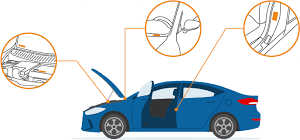
VIN Lookup
Please input VIN to access vehicle history records and additional information!
Conducting a search on georgiaplatelookup.com is subject to our Terms of Service and Privacy Notice. You acknowledge that georgiaplatelookup.com is not a consumer reporting agency under the FCRA and the information provided cannot be used for any unlawful purpose.
Databases Updated on May 04, 2025
Drive with Confidence!
Explore a Vehicle Using its License Plate Number. Gain insights into a vehicle you currently possess or intend to purchase.
What is a vehicle identification
number (VIN)?
A vehicle's VIN is its unique identifier, like a fingerprint. It's made up of 17 characters, including numbers and capital letters, showcasing the car's distinct features and manufacturer. The VIN helps track recalls, registrations, warranties, thefts, and insurance coverage.
Where Can I Find the VIN?
You can locate the VIN by checking the dashboard on the driver's side. Simply stand outside the vehicle on the driver's side and look at the corner where the dashboard meets the windshield. If not found there, check the door post inside the driver's side door. It's common to find the VIN displayed in this area. Refer to the image below for guidance:

Search for the VIN in additional locations:
- Insurance card or policy
- Vehicle title and registration